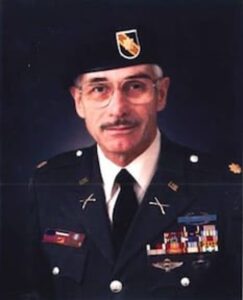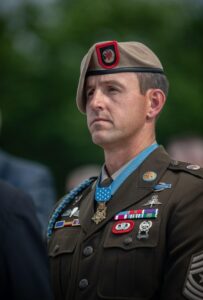 POW/MIA Recognition Day is a day for everyone to honor the sacrifices made by U.S. service members who were prisoners of war and those who are still missing in action. There are more than 80,000 U.S. service members missing in action. Each day the Defense POW/MIA Accounting Agency (DPPAA) is working towards locating and recovering missing personnel from past conflicts. We encourage you to take a minute to reflect and learn about some of America’s unaccounted for service members.
POW/MIA Recognition Day is a day for everyone to honor the sacrifices made by U.S. service members who were prisoners of war and those who are still missing in action. There are more than 80,000 U.S. service members missing in action. Each day the Defense POW/MIA Accounting Agency (DPPAA) is working towards locating and recovering missing personnel from past conflicts. We encourage you to take a minute to reflect and learn about some of America’s unaccounted for service members.
Throughout American history, there have been over 500,000 prisoners of war across all conflicts, many who died while in captivity. While fighting for our freedom, these prisoners had to endure brutal captivity and had their freedoms completely stripped from them. They know the true price of freedom, sacrifice and courage. Their bravery is a legacy that needs to be remembered.
A few of the hundreds of thousands of POW/MIA service members were awarded the Medal of Honor for their gallantry and intrepidity. Read below for a few of their citations and heroic stories.
Missing in Action
Brigadier General Kenneth Walker posthumously received the Medal of Honor in World War II after his plane was shot down and he was killed while leading a daylight bombing over Rabaul, New Britain. His body, the bodies of the eight others in the crash and the plane wreckage were never found. He is a legacy in the aviation world, publishing many articles and becoming part of the “Bomber Mafia” that pushed for the bombardment form of military aviation. Walker’s son is actively working with military officials to help bring his father and the other heroes on that plane home.
First Lieutenant Alexander Bonnyman posthumously received the Medal of Honor in World War II during the assault on a Japanese bombproof shelter during the Battle of Tarawa, where he was killed while ordering more charges to be brought forward. Bonnyman ran a copper mining business that was needed to produce vital material for the war effort, making him exempt from military obligation. However, he still enlisted in the US Marine Corps in 1942. His remains were listed as “non-recovered” until 2015, when the nonprofit ‘History Flight’ recovered the remains of 36 Marines. His grandson published the book, Bones of My Grandfather: Reclaiming a Lost Hero of World War II.
Prisoners of War
Staff Sergeant Jon Cavaiani received the Medal of Honor for his actions in Vietnam War. After his platoon came under intense attack and organized his unit’s defense. During evacuation by helicopter, Cavaiani voluntarily stayed on the ground to direct the large evacuation effort. In the morning, there was another enemy attack where he ordered and helped provide cover for the remaining small group of men to escape. He was then captured and spent the next two years as a prisoner of war until his release in 1973 during Operation Homecoming. He remained in the Army until 1990, completing over 5,000 jumps from all over the world.
Colonel Donald Cook posthumously received the Medal of Honor for his actions in Vietnam. He was wounded and captured by the enemy in December 1964. He was held as a prisoner of war where he assumed the role as the senior prisoner, even though he wasn’t. He volunteered to give other men his medicine and unselfishly put the overall health and wellbeing of his other prisoners above his health. He died from malaria three years later.
George “Bud” Day received the Medal of Honor for his actions in Vietnam. He was a prisoner of war, not once but twice. He was forced to eject from his aircraft where he was immediately captured, interrogated and tortured. Day eventually escaped into the jungle, surviving on berries and frogs. After swimming across a river, he wandered aimlessly for days, lost. He was ambushed, recaptured and suffered from gunshot wounds. Day was placed back in his original prisoner of war camp and several near Hanoi, where he was beaten, starved and tortured. He shared a cell with future senator and presidential candidate John McCain. After five years and seven months as a North Vietnamese prisoner of war, he was released on March 14, 1973. He is the only person to be awarded both the Medal of Honor and the Air Force Cross.
Sergeant William Port posthumously received the Medal of Honor for his actions in Vietnam. He rescued a wounded soldier and then used his body to smother the blast of an enemy grenade, protecting his fellow soldiers. After surviving the blast, he was captured by the enemy. Ten months later he died while a prisoner of war.
Captain Lance Sijan posthumously received the Medal of Honor for his actions in Vietnam. Sijan was forced to eject from his aircraft and evaded capture by enemy soldiers for more than six weeks. Seriously injured, suffering from shock and severe weight loss, Sijan was captured by enemy soldiers. He was able to overpower one of his guards and crawl into the jungle, however, he was recaptured after a few hours. He was then transferred to another prisoner of war camp where he was held in solitary confinement, tortured and interrogated. He never complained to any fellow prisoners or divulged any information to his captors. He died as a prisoner of war at ‘Hanoi Hilton’.
Commander James Stockdale received the Medal of Honor for his actions in Vietnam. His plane was struck by enemy fire, forcing him to eject over North Vietnam where he was captured as a prisoner and beaten. He was held at the ‘Hanoi Hilton’ for the next seven and a half years and was one of the main organizers for prisoner resistance and was known as one of the eleven members of the ‘Alcatraz Gang’ and placed in solitary confinement. Stockdale’s wife, Sybil, formed The League of American Families of POWs and MIAs, where she personally made demands known to acknowledge the mistreatment of POWs at the Paris Peace Talks.
Lieutenant Colonel Leo Thorsness received the Medal of Honor for his actions in Vietnam. While on a suppression mission, Thorsness engaged in a heroic air mission involving destroying multiple enemy cluster bombs and engaging the enemy in a turning dogfight. Eleven days after his Medal of Honor actions, he was on his 93rd mission and was forced to eject from his aircraft. He was captured as a prisoner of war and spent over six years as a prisoner, spending time in solitary confinement and enduring severe torture. He was released during Operation Homecoming.
Captain Humbert Roque “Rocky” Versace received the Medal of Honor for his actions while a prisoner of war in Vietnam. With less than two weeks left of his volunteered tour extension, Versace’s unit was ambushed, he was wounded and captured in the process. The enemy separated Versace from the other prisoners and the last time they heard his voice, he was loudly singing ‘God Bless America’. He was later executed, and his remains have never been found.

Navigating the Darkest Night | The Courageous Leadership of Rear Admiral Bruce McCandless
Recipient: Bruce McCandless Branch: U.S. Navy Combat: World War II Sometimes fate has a way of showing us exactly where we need to be and


